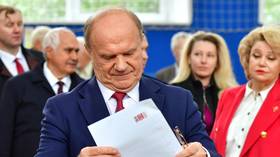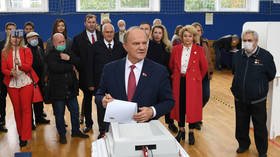Russian Communist Party issues appeal on online voting

The top brass of Russia’s Communist Party has submitted a bill that would abolish online voting, insisting that the new electronic election system caused serious problems during parliamentary polls, held in September.
The group, headed by leader Gennady Zyuganov, put forward a motion on Thursday that proposed removing provisions from Russian election laws that allow citizens to cast their ballots digitally. According to them, this step should be taken “until the remote electronic voting system is fully developed, allowing for the basic principles of elections to be realized on the technical, organizational, and legal levels.”
The lawmakers argued that the parliamentary elections, which took place between September 17-19, demonstrated “serious deficiencies in remote electronic voting,” and said online polling should not be used again until it can be improved.
Explaining their objections to the current system, they cited a lack of mechanisms for guaranteeing that people voting electronically were genuine, and the absence of regulations for election observance online. They also claimed that there are not enough protections in place against software hijacking or attacks from hackers.
The Communist Party previously announced that it would not accept the results of Moscow’s online voting in the September elections. Leading MP Dmitry Novikov said an “entire group” of his party’s candidates had secured victory in single-member districts in the capital, but then lost after electronic results were tallied.
The Communist Party won 20% of the votes, coming in second to the ruling United Russia party. This was the Communists’ best showing in years, with Zyuganov saying that he hadn’t seen such support since 1996, when he came in second to Boris Yeltsin in the country’s presidential election. He noted that the party did particularly well in “deep Russia,” in regions in Siberia and the Far East.
United Russia, which supports Russian President Vladimir Putin, maintained its super-majority, which allows it to pass constitutional reforms without support from other parliamentary groups. However, several opposition figures accused Moscow of rigging the election, despite gains for anti-Kremlin parties in some regions.
Aside from the Communist Party’s complaints about electronic voting, videos also circulated of officials stuffing ballot boxes, with the country’s election chief pledging an inquiry and firing a number of local officials.















